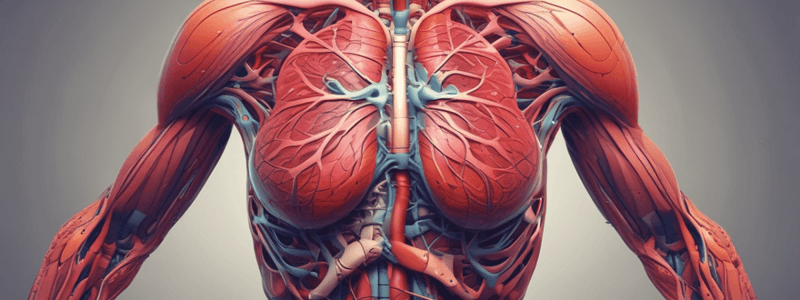Podcast
Questions and Answers
What is the primary function of red blood cells?
What is the primary function of red blood cells?
- Transporting lymph fluid
- Carrying oxygen to tissues (correct)
- Controlling involuntary body functions
- Clot formation after injury
Which component of blood determines an individual's blood type?
Which component of blood determines an individual's blood type?
- Plasma
- White blood cells
- Platelets
- Antigens on red blood cells (correct)
What is the primary function of white blood cells (leukocytes)?
What is the primary function of white blood cells (leukocytes)?
- Transporting oxygen
- Clot formation
- Determining blood type
- Leaving blood vessels to move toward tissues when needed (correct)
Which part of the circulatory system is used to measure blood pressure?
Which part of the circulatory system is used to measure blood pressure?
What is the approximate distribution of blood in the body?
What is the approximate distribution of blood in the body?
What is the primary function of the lymphatic system?
What is the primary function of the lymphatic system?
Flashcards are hidden until you start studying
Study Notes
- Blood is composed of 55% plasma and 45% formed elements including red blood cells, white blood cells, and platelets. Plasma is a watery fluid containing water, proteins, electrolytes, and nutrients.
- Red blood cells carry oxygen to tissues and contain hemoglobin. Antigens on red blood cells determine blood types.
- White blood cells (leukocytes) leave blood vessels to move toward tissues when needed. Platelets are necessary for clot formation following injury.
- The circulatory system includes major arteries where a pulse can be palpated, different pulse points, and blood pressure measurement using a sphygmomanometer.
- Systemic vascular resistance refers to the dilation or constriction of blood vessels. Shock occurs when there is inadequate circulation or perfusion in the body.
- Most blood is distributed unevenly in the body, with 30% in the heart, arteries, and capillaries, and 70% in veins and venules.
- The lymphatic system transports lymph, a fluid derived from interstitial fluid, back to the circulatory system via lymph nodes.
- The nervous system includes the brain, spinal cord, and nerves, divided into the central and peripheral nervous systems. It controls voluntary and involuntary body functions.
- The digestive system aids in food digestion, absorption of nutrients, and excretion. It includes various organs like the stomach, pancreas, liver, small intestine, large intestine, and appendix.
- The endocrine system regulates bodily functions through hormone secretion from glands like the pituitary, thyroid, pancreas, and adrenal glands. Hormones control many body functions.
- The urinary system filters waste from the blood, controls fluid balance, eliminates waste, and regulates pH balance. Kidneys concentrate urine by reabsorbing water.
- The male and female reproductive systems have specific glands and hormones responsible for sex characteristics, menstrual cycles in females, and sperm production in males.
- During the menstrual cycle, an ovum matures, ovulation occurs, and if fertilization does not happen, hormonal changes lead to shedding of the uterine lining.
Studying That Suits You
Use AI to generate personalized quizzes and flashcards to suit your learning preferences.




